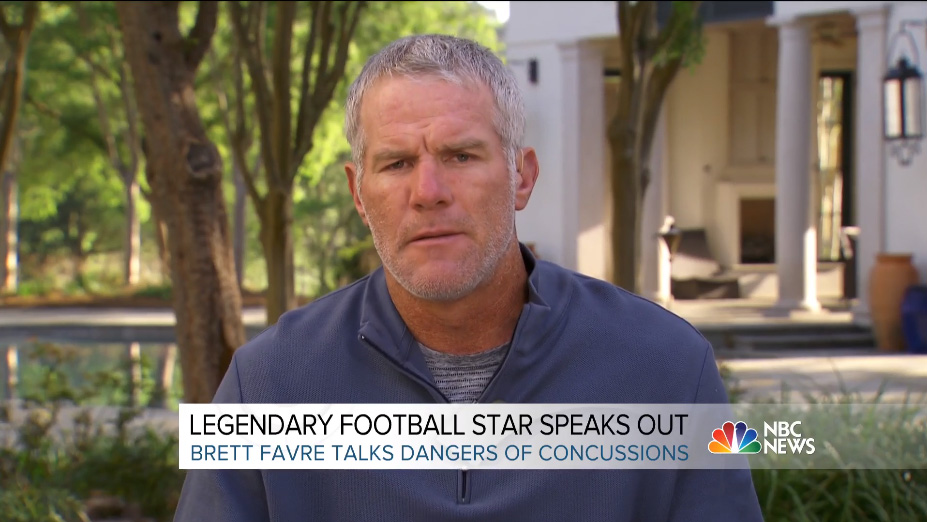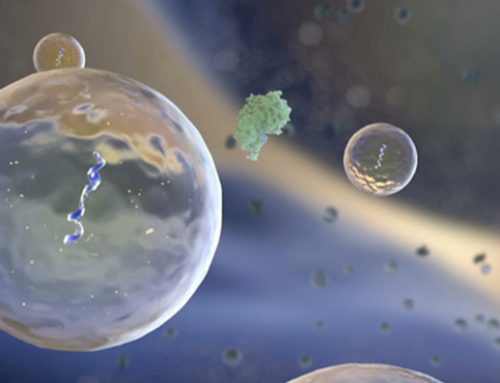Last week, Brett Favre spoke with Megyn Kelly about the state of his mental health today after receiving many concussions over his two decades of playing football.
In the interview, Brett describes his cognitive decline, something he thought would never happen. His experience ranges from increased forgetfulness to impaired motor function. These are common symptoms associated with a TBI, a condition often called a concussion. A rising concern is the chance of CTE, or Chronic Traumatic Encephalopathy, a neurodegenerative disease found in people who have had multiple head injuries.
Today, brain injuries are something we now understand how to diagnose and treat. The better news is we are able to cure those that suffer a brain injury, making getting your life back possible!
The interview: Brett Favre opens up about concussions and football on Megyn Kelly TODAY
More on Traumatic Brain Injury/Concussion
Results of recent and ongoing studies have made it clear that brain injuries like Traumatic Brain Injury (TBI) pose substantial risk to pituitary function, multiple hormones and overall health and wellness. Hypopituitarism may benefit with appropriate hormonal replacement receiving replacement therapy such as antidiuretic hormone, glucocorticoid, and thyroid hormones when needed.
Testosterone, estrogen, progesterone, pregnenolone, DHEA, and recombinant human growth hormone replacement therapy should also be introduced as indicated. Signs and symptoms of post-TBI hypopituitarism are often masked by what has been assumed to be post-traumatic syndrome. It is possible to improve the quality of life and enhance the post traumatic brain injury period with hormone replacement therapy and supplementation that addresses neuro-inflammation.
Clinical evidence has demonstrated that TBI may frequently cause hypothalamic-pituitary dysfunction, probably contributing to a delayed or hampered recovery from TBI. Changes in pituitary hormone secretion may be observed during the acute phase post-TBI. Diminished pituitary hormone secretion, caused by damage to the pituitary and/or hypothalamus, may occur at any time after TBI.
The most common alterations appear to be gonadotropin and somatotropin deficiency, followed by corticotropin and thyrotropin deficiency.
In order to improve outcome and quality of life in individuals who have suffered a TBI an adequate replacement therapy program is of paramount importance.
If you suffered a head injury from:
- Fall
- Gunshot Wound
- Explosive Blasts
- Repetitive Gunfire
- Penetrating Head Injury
- Deceleration Injury
- Chemical Exposure
- Hypoxia or lack of oxygen
- Infection
- Stroke
- Car Accident
- Motorcycle accident
- Numerous Surgeries
Concussion(s) from any sport like:
- Football
- Baseball
- Soccer
- Cycling
- Skiing
- Snowboarding
The Effects of TBI
Most people are unaware of the scope of TBI or its overwhelming nature. TBI is a common injury and may be missed initially when the medical team is focused on saving the individual’s life. Before medical knowledge and technology advanced to control breathing with respirators and decrease intracranial pressure, which is the pressure in the fluid surrounding the brain, the death rate from traumatic brain injuries was very high. Although the medical technology has advanced significantly, the often overlooked effects of TBI are significant.
TBI is classified into two categories: mild and severe
A brain injury can be classified as mild if loss of consciousness and/or confusion and disorientation is shorter than 30 minutes. While MRI and CAT scans are often normal, the individual has cognitive, physical, and social problems such as:
- fatigue
- headache
- difficulty thinking
- memory problems
- brain fog
- attention deficits
- mood swings
- frustration
- muscle weakness
- exercise intolerance
- weight gain
- isolation
- depression
- anxiety
- panic attacks
- social phobias
These injuries are commonly overlooked. Even though this type of TBI is called “mild”, the effect on the family and the injured person can be devastating.
Severe brain injury is associated with loss of consciousness for more than 30 minutes and memory loss after the injury or penetrating skull injury longer than 24 hours. The deficits range from impairment of higher-level cognitive functions to comatose states. Survivors may have:
- limited function of arms or legs
- abnormal speech or language
- loss of thinking ability
- emotional problems
The range of injuries and degree of recovery is very variable and varies on an individual basis.
The effects of TBI can be profound. Individuals with severe injuries can be left in long-term unresponsive states. For many people with severe TBI, long-term rehabilitation is often necessary to maximize function and independence. Even with mild TBI, the consequences to a person’s life can be dramatic. Change in brain function can have a dramatic impact on family, job, social and community interaction.
So how do we treat a Traumatic Brain Injury?
First thing we recommend is to have a comprehensive lab performed. The labs values we look for with any TBI patient are as follows.
- Growth Hormone
- Somatotropin C (IGF-1)
- IGF BP-3
- DHEA-S
- Testosterone Free
- Testosterone Total
- Dihydrotestosterone (DHT)
- Sex Hormone Binding Globulin
- Prostatic PSA
- Estrone (E1)
- Estradiol (E2)
- Pregnenolone
- Progesterone
- FSH
- LH
- Prolactin
- Copper
- Zinc
- Insulin
- Iron
- TSH
- T3, Free
- T4, Free
- rT3
- TSH Index
- T3/rT3 Ratio
- TPO
- ACTH
- Cortisol AM
- Homocysteine
- hs-CRP
- Hemoglobin A1c
- Vitamin D3
TBI Treatment for Veterans
The Warrior Angels Foundation is a 501(c)(3) non-profit organization founded and run by combat Veteran brothers. Their goal is to give life-changing treatment to those suffering from Traumatic Brain Injuries. We know so many Veterans returning from active duty are commonly plagued with PTSD and TBI, which is often misunderstood and misdiagnosed. The Warrior Angels Foundation works closely with Veterans and their families to get them the proper care they deserve.
Dr. Rob, a Veteran of the U.S. Army, 3rd Infantry Division, 2nd Battalion, 64th Armor is a participating physician with the Warrior Angels Foundation. To apply for the program, visit www.tbimedlegal.com and fill out the form. A representative from the foundation will contact you to discuss the next steps of the program.
There is no obligation, just help from fellow Veterans who have been there and care about your health.
Learn more about The Warrior Angels Foundation
ReNue Health is located conveniently in Springboro, Ohio with easy access from Dayton International Airport, Cincinnati International Airport or the adjacent Wright Brothers Private Airport (MGY) for those travelling by private aviation.
Dr. Rob sees new patients in Ohio. Only one visit is necessary to perform a comprehensive history, interview, and education. Follow up evaluations, adjustments and balancing of hormones are done by phone or written communications and a return visit to Dr. Rob is not necessary. Ongoing testing and adjustment is mandatory and performed through a laboratory convenient to your home.
Appointments can be made by calling the main office number 937-350-5527 for information.




